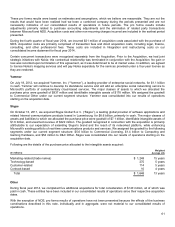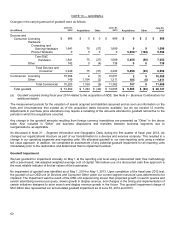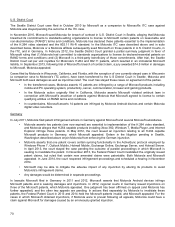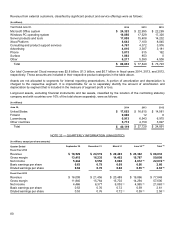Microsoft 2014 Annual Report Download - page 72
Download and view the complete annual report
Please find page 72 of the 2014 Microsoft annual report below. You can navigate through the pages in the report by either clicking on the pages listed below, or by using the keyword search tool below to find specific information within the annual report.
71
United Kingdom
In December 2011, Microsoft filed an action against Motorola in the High Court of Justice, Chancery Division, Patents
Court, in London, England, seeking to revoke the UK part of the European patent asserted by Motorola in Germany
against the ActiveSync protocol. In February 2012, Motorola counterclaimed alleging infringement of the patent and
seeking damages and an injunction. In December 2012, the court ruled that Motorola’s patent is invalid. The court also
ruled that the patent, even if valid, would be licensed under the grant-back clause in Google’s ActiveSync license.
Motorola appealed and the appeals court affirmed the lower court’s ruling in Microsoft’s favor in November 2013. Motorola
has exhausted all appeals and the rulings in Microsoft’s favor are final.
IPCom patent litigation
IPCom GmbH & Co. is a German company that holds a large portfolio of mobile technology related patents spanning
about 170 patent families and addressing a broad range of cellular technologies. IPCom has asserted 19 of these patents
in litigation against Nokia and many of the leading cell phone companies and operators. Three of the infringement suits
against Nokia (now assumed by Microsoft through the NDS acquisition) are still pending in courts in Germany, England,
and Italy. These courts have held a number of IPCom’s patents were invalid or not infringed. We continue to contest the
validity or infringement of the patents remaining in dispute.
Interdigital patent litigation
InterDigital Technology Corporation and InterDigital Communications Corporation (collectively, “IDT”) filed four patent
infringement cases against Nokia in the ITC and in U.S. District Court for the District of Delaware between 2007 and 2013.
We are being substituted for Nokia in these cases. Each case includes other co-defendants because most of the patents
at issue allegedly relate to 3G and 4G wireless communications standards essential functionality. The suite of cases
include three ITC investigations where IDT is seeking an order excluding importation of 3G and 4G phones into the U.S.
and one active case in U.S. District Court in Delaware seeking an injunction and damages.
European copyright levies
We have assumed from Nokia all potential liability due to Nokia’s alleged failure to pay “private copying levies” in various
European countries based upon sale of memory cards and mobile phones that incorporate blank memory. The levies are
based upon a 2001 EU Directive establishing a right for end users to make copies of copyrighted works for personal or
private use, but also allowing the collection of levies based upon sales of blank media or recording devices to compensate
copyright holders for private copying. Various collecting societies in EU countries initiated litigation against Nokia, stating
that Nokia must pay levies not only based upon sales of blank memory cards, but also phones that include blank memory
for data storage on the phones, regardless of actual usage of that memory. The most significant cases against Nokia are
pending in Germany and Austria, due to both high volume of sales and high levy amounts sought in these countries. We
are litigating against certain collecting societies on the basis that the levy schemes exceed what the EU Directive and
European Court of Justice decisions permit.
Other patent and intellectual property claims
In addition to these cases, there are approximately 90 other patent infringement cases pending against Microsoft.
Product-Related Litigation
U.S. cell phone litigation
Nokia, along with other handset manufacturers and network operators, is a defendant in 19 lawsuits filed in the Superior
Court for the District of Columbia by individual plaintiffs who allege that radio emissions from cellular handsets caused
their brain tumors and other adverse health effects. We have assumed responsibility for these claims as part of the NDS
acquisition. Nine of these cases were filed in 2002 and are consolidated for certain pre-trial proceedings; the remaining
ten cases are stayed. In a separate 2009 decision, the Court of Appeals for the District of Columbia held that adverse
health effect claims arising from the use of cellular handsets that operate within the U.S. Federal Communications
Commission radio frequency emission guidelines (“FCC Guidelines”) are pre-empted by federal law. The plaintiffs allege
that their handsets either operated outside the FCC Guidelines or were manufactured before the FCC Guidelines went
into effect. The lawsuits also allege an industry-wide conspiracy to manipulate the science and testing around emission
guidelines. In September 2013, defendants in the consolidated cases moved to exclude plaintiffs’ expert evidence of
























